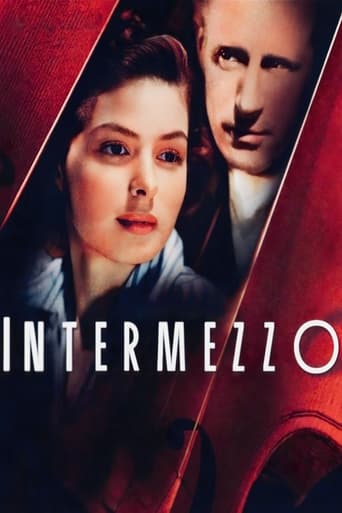didi-5
The original version of 'Intermezzo', starring Ingrid Bergman - who later recreated the role in Hollywood opposite Leslie Howard - and Gosta Ekman, is an involving story of a mid-life crisis, an intermezzo, a passion driven by music.Tired, bored, and a stranger to his family, Holger Brandt (Ekman) is searching for a new accompanist but when he finds his daughter's music teacher, Anita Hoffmann (Bergman) events begin to move in quite a different direction. Of course we don't see any romantic involvements beyond a bit of friendly kissing and heightened dialogue between Brandt and Hoffmann which pinpoints their relationship - and the film is all the better for it.As good as the version with Bergman/Howard, this version is rarely seen but well worth catching. Ekman - who has more than a passing resemblance to the great German actor Conrad Veidt - is the perfect suffering artist, looking for excitement and a new definition of love; while Bergman makes the character of Hoffmann believable in her infatuation with Brandt without seeing ridiculous.
ackstasis
In musical terms, an intermezzo is typically a short composition that fits between two main movements of a larger musical work. For professional violinist Holger Brandt (Gösta Ekman), his romance with Anita Hoffman (the irreplaceable Ingrid Bergman) is exactly that, a brief interlude from his wife and children. Though he may have convinced himself that his love for Anita will last forever, it is inevitable that the older man will eventually return to where his heart truly lies, with his grown son Åke (Hasse Ekman) and precocious daughter Ann-Marie (Britt Hagman). His temporary liaison with a younger woman, as shameful as it might seem, does represent something akin to true love, since it had the power to draw him from his family. However, Anita's selfless decision to leave finally persuades Holger to return home, to recognise that there is a more important love waiting for him in Sweden.Gustaf Molander's 'Intermezzo' is a film that seemingly has everything going for it: Åke Dahlqvist's cinematography is absolutely beautiful; the acting performances are natural and sincere; Ingrid Bergman is perhaps the greatest beauty ever to grace the silver screen. However, despite a relatively brief running time, the film moved so slowly that it was difficult to hold my attention. A story as simple as that of 'Intermezzo' did not require 90 minutes to unfold, and several scenes could easily have been trimmed without any detrimental effect on the overall quality of the film. Though she had starred in numerous Swedish films previously, it was 'Intermezzo' that proved Ingrid Bergman's breakthrough role, and its success led to her migration to Hollywood in 1939, where she revived her role for an American remake, 'Intermezzo: A Love Story (1939),' opposite Leslie Howard {a version that I am yet to see}.Aside from Bergman, who is lovely as always, Gösta Ekman {in one of his final roles} gives a solid performance as Professor Brandt, whose infatuation with new love has led him to neglect those who are most important to him. Though I had not initially recognised his name, Ekman is, of course, the actor whose performance I had enthusiastically commended in my review of F.W. Murnau's 'Faust - Eine deutsche Volkssage (1926).' Also noteworthy are Inga Tidblad as Holger's knowing wife, Margit, and a delightful Britt Hagman as young Ann-Marie Brandt. While I must admit that I found the film very slow-going, perhaps this sluggishness served a very important purpose. In one of the film's final scenes, concerning the incident outside the school, I suspect that what transpired could never have been as shocking or jarring as it was, if not for the long period of sedateness that had preceded it.
MartinHafer
This is the Swedish version of INTERMEZZO. The film was remade for English-speaking audiences just 3 years later with a mostly non-Swedish cast, except for Ingrid Bergman who reprized her role from the original.While this Swedish version isn't quite as polished as the other, it is the original and seems a little less polished--and this ISN'T necessarily a bad thing. Because of the lack of polish, the film seems more like it was filmed with real people and the problems seemed more universal. Also, while I didn't approve of the lead running around on his family, it sure brought up a lot of moral questions and made me think. A decent, though not great, film.
Edgar Soberon Torchia
The original version of this Swedish melodrama by Gustaf Molander is short (the American remake is even shorter) and to the point. A famous and not very young violinist (Gösta Ekman) meets a pretty and fresh-as-a-daisy pianist (Ingrid Bergman), he believes he met his match and she falls for him or something he has. Although the final solution tries to make us believe that the violinist is a fervent family man who will return to the loving arms of his abandoned but addict-to-marriage wife (Inga Tidblad), we know better: even if Hollywood insists in pairing ageing male stars with girls who could be their great-granddaughters, the truth is that age does count. On the pianist's side, it is obvious that his fame and talent impressed her, but when she wins a "stipend" to study, she takes the right decision. Interestingly, Hans Ekman who plays Åke, the son (to his real-life father) turned into filmmaking and was Ingmar Bergman's rival for a while.


